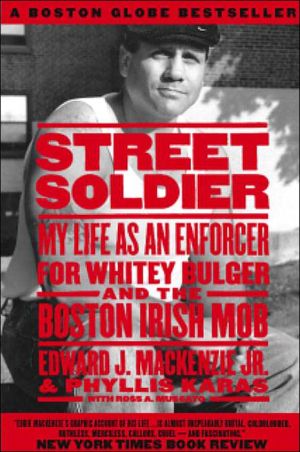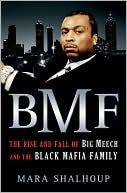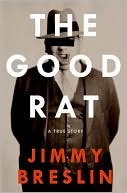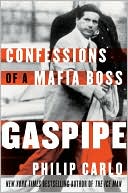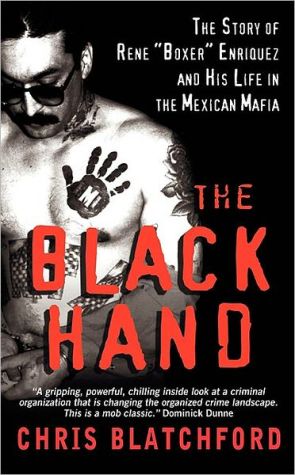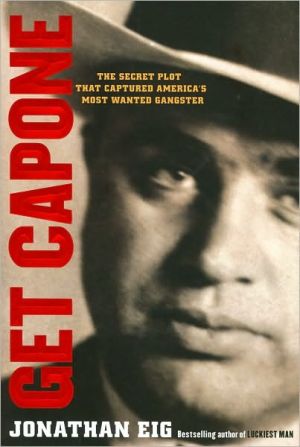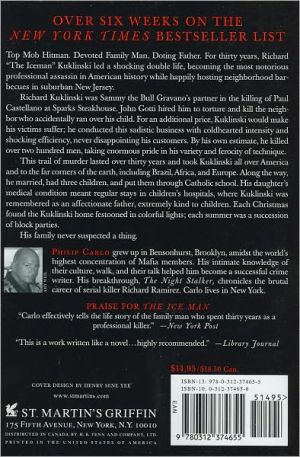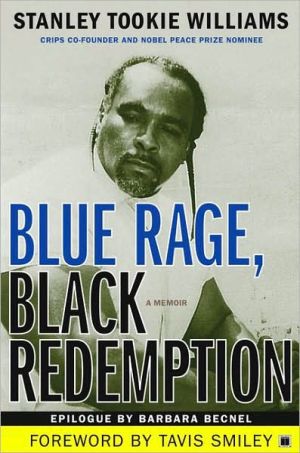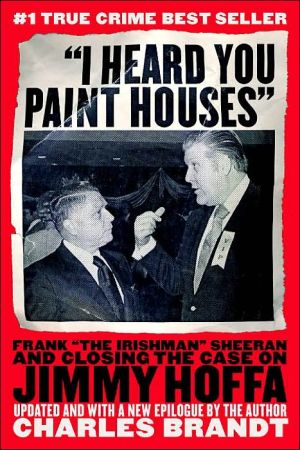Street Soldier: My Life as an Enforcer for Whitey Bulger and the Boston Irish Mob
The almost unbelievable story of endemic corruption, and the official condoning by the FBI of violent crimes committed by James “Whitey” Bulger and his South Boston Irish mob, entered a new chapter with Bulger’s arrest in California. For decades the FBI let Bulger get away with murder, protecting him from prosecution for crimes it knew he had committed and allowing him continued control of his criminal enterprise in exchange for information about the rival Italian mafia and even members of...
Search in google:
For decades the FBI let James “Whitey” Bulger get away with murder, allowing him continued control of his criminal enterprise in exchange for information. He went on the lam in 1995 and today follows top-ranked Osama bin Laden on the FBI’s Ten Most Wanted List.Edward J. MacKenzie, Jr. was a drug dealer and enforcer who would do just about anything for Bulger. In this compelling eyewitness account, Eddie Mac delivers the goods on his one-time boss and on such former associates as Stephen “The Rifleman” Flemmi and turncoat FBI agent John Connolly.Street Soldier is also a story of the search for family, for acceptance, for respect, loyalty, and love. Abandoned by his parents at the age of four, Mackenzie became a ward of the state, suffered physical and sexual abuse, and eventually drifted into Bulger’s orbit.The Eddie Mac who emerges in these pages is complex: An enforcer who was also a national kick-boxing champion; a womanizer who fought for custody of his daughters; a kid never given much of a chance who went on, as an adult, to earn a college degree in three years; a man who lived by a strict code of loyalty but also helped set up a sting operation that would net one of the largest hauls of cocaine ever seized.Street Soldier is as disturbing and fascinating as a crime scene, as heart-stopping as a bar fight, and at times as darkly comic as Quentin Tarantino’s Pulp Fiction or Martin Scorsese’s Good Fellas. The New York Times Eddie MacKenzie's graphic account of his life as a violent street criminal in South Boston (he calls himself an urban street predator) is almost unspeakably brutal, coldblooded, ruthless, merciless, callous, cruel -- and fascinating. Reading it is like happening upon a street crime and entering the perpetrator's mind. It's not pretty. — John W. Dean
STREET SOLDIER\ MY LIFE AS AN ENFORCER FOR WHITEY BULGER AND THE BOSTON IRISH MOB \ \ By EDWARD J. MACKENZIE JR. & PHYLLIS KARAS WITH ROSS A. MUSCATO \ STEERFORTH PRESS\ Copyright © 2003 Edward I. MacKenzie Jr. and Phyllis Karas\ All right reserved.\ ISBN: 1586420631 \ \ \ \ Chapter One\ \ Danbury Federal Penitentiary \ If you can't do the time, don't do the crime."\ My lawyer Al Nugent used to say that to me every time I called him up with a new "problem." Not that this latest problem came as a grand shock in August 1990. We'd gotten the word from someone who worked at the Justice Department. Big drug sting coming up: South Boston dealers going down. And that was me, all right: big-time drug dealer for Whitey Bulger.\ James "Whitey" Bulger, for those who haven't looked around the walls of their local post office lately, is presently on the FBI's Ten Most Wanted List. He was on the lam for four and a half years before the FBI decided he wasn't coming back on his own and, in August 1999, hung his picture right next to that of Osama bin Laden.\ Whitey Bulger was head of the South Boston mob, a kind of Irish mafia that ran gambling rackets, extorted protection money, peddled black market products, pushed tons of pot and cocaine, and killed those who got in its way. He is being sought for extortion and RICO (Racketeering Influenced and Corrupt Organizations Act) charges, along with eighteen counts of murder. Yeah, that's my boss. And if you help find him, there's a million-dollar check waiting with your name on it.\ Whitey is also, of course, the older brother of perhaps the most powerful and cutthroat politician in Massachusetts, the one and only William M. Bulger, who spent seventeen years as president of our state senate, and all his life in South Boston, which we call Southie. One brother a feared, brilliant, and ruthless outlaw, and the other brother a feared, brilliant, and ruthless politician; one a graduate of Alcatraz, the other of Boston College Law School; both setting up practice in Southie. A Boston Magazine article characterized the Brothers Bulger perfectly: "The yin and yang of absolute power." When Billy took over the reins of the Massachusetts Senate in 1978, the brothers began their evenly balanced control of South Boston.\ But back then, Whitey controlled me. I tried to be careful, always following his orders, keeping a low profile, not talking on the telephone, staying far away from anyone we suspected of being a rat or wearing a wire. But we were all dirty and we knew we were dirty, so it was no surprise there'd be a heavy price to pay.\ The life I was leading then was good. Me and Tommy Dixon, one of Whitey's top sellers, were roomies in a luxurious new apartment in Southie, raking in a ton of money, about $50,000 to $75,000 on a good week, less the $20,000 we paid in tribute to Whitey. This was our cut for spreading coke and marijuana throughout Southie and the Boston suburbs, and for making sure that Whitey's operation ran smoothly. When we weren't distributing drugs, we were breaking the legs of punks and deadbeats on Whitey's orders.\ I was thirty-one, a criminal with a long record, a $320,000 Spanish colonial stucco house on a half acre of land in Milton, a spanking new Vanden Plas Jaguar, a Pathfinder, and three Rolex watches. My two daughters went to private parochial school and had everything their hearts desired. I ate at the most expensive restaurants and wore designer clothes whose names I couldn't pronounce. There was nothing I wanted that I couldn't buy.\ Day in and day out, I did my job, satisfied with the way I felt when I woke up in the morning and the way I felt when I went to bed at night. For a tenth-grade dropout who'd spent his childhood bouncing from one hideous foster home to the next, I was living the life I'd only dreamed about when I was young. Working for Whitey was as good as it got. True, he was a homicidal psychopath. I'd known that from the first moment I met him. But he was my homicidal psychopath, my boss, the man I respected and feared and served with every bit of loyalty in my being. He told me to beat someone within an inch of his miserable life; I did it. He told me to burn down a house; I did it. He told me to avoid drugs; I did. He told me to respect the Code of Silence; I did. If Whitey, like Italian mobsters, had made me swear to put his needs before those of my children, I would have drawn the line there. But he never did. So, every word he spoke was my law.\ One hot August morning, it all fell apart. I was outside my apartment on Gold Street in South Boston. It was 6 A.M., and I was heading out for coffee and then to Connolly's Corner Café - a bar of which I was the manager of record, when I noticed an undercover car slowly driving by with two cops inside. This must be the bust we'd heard about, I thought. The car crawled beside me for a few minutes before I said, "Hey, you guys looking for me?"\ "Who are you?" a cop yelled back.\ "Eddie MacKenzie" I said. "And if you want me, I ain't running from no one. So, here I am." They called on their radio and, sure enough, I was on their arrest list. They got out real nice, like we were friends, and cuffed me and put me in the back. This wasn't the first time I'd been arrested or sent away. My criminal record, which included attempted murder, assault with a deadly weapon, mayhem, breaking and entering, and rape, was nine pages long.\ "We hope everybody gives up so easily," the driver said. We headed over to Connolly's Bar, where television crews from all the local stations were waiting, obviously having been informed exactly who was being picked up where. The federal Drug Task Force, which included the U.S. Attorney's office, the Drug Enforcement Agency, the state police, and the Boston police, had raided Connolly's a week earlier but found nothing. I'd been there when they searched the premises, looking for information on Whitey's empire, but I hadn't been interviewed by the task force. They spoke to no one, just came in with a warrant and searched for evidence. Nobody put a microphone in my face this time, but the cameras were all over me as the cops transferred me to an unmarked van. The police deliberately took their time, making me do the perp walk for the media as they put me in the van in front of my bar.\ They ended up arresting quite a crew that day. A collection of fifty-one drug dealers, ranging in importance from scumbag drunks who were petty pushers to major lieutenants, like me and my roomie Dixon, who were running several millions of dollars a year in coke and pot and were the foundation of Whitey's drug empire. The van transported us, ten to a van, to the Coast Guard base in the North End of Boston. There, each of us was singled out for another perp walk by the media on our way to the cafeteria, which served as a holding area. The Drug Task Force held a press conference and answered a few questions for the press, but none of us perps was questioned. In the cafeteria, the DTF asked each one of us separately if we wanted to cooperate. Not one head nodded.\ We were then transferred in groups of ten to the U.S. Courthouse in downtown Boston for arraignment. While we were huddled in the holding cell in the courthouse, I called my lawyer, Al Nugent. I was shitting bricks: the eighty-page indictment had so many charges on it that it seemed as if I'd be going away for a hundred years. But, as Al patiently explained to me, it was a group indictment and there were only two charges against me: conspiracy to distribute cocaine and use of a telephonic device - in my case, the telephone - in a drug transaction. The first charge could put me away for twenty years; the second, four. It didn't look great. Al told me that I should have done things differently. I should never have given up so sweetly. Unlike most of the other drug dealers I'd been arrested with, I'd set aside money for a time like this. I should have avoided the cops, headed to Al's office, and, with him at my side, turned myself in. Then I could have made bail and avoided some of this mess. But I'd been stupid. And so I was stuck with the rest of the dummies.\ As the bail hearings went on, those who were designated not dangerous, or who posed no threat of flight, were sent home on personal recognizance to await trial. I wasn't that fortunate. With my record - coupled with the level and extent of my involvement with Whitey and the drug ring, and the fact that I was roommates with Tommy Dixon, the ringleader of the group - it was determined that I was going to be held for a while in a government facility. I would not be heading back to Gold Street that afternoon.\ So, me, my buddy Dixon, and ten other guys were designated for transport to Danbury Federal Penitentiary in Connecticut, where we'd sit while the powers that be determined whether we would make bail or be held until trial. I knew that I was looking at a weekend in the can, no matter what. The wheels of justice do not spin on weekends. The feds purposely arrested us on a Friday, just to make us suffer a little more. You better believe that on a Friday afternoon in August, no federal prison employee is going to start any type of processing that might cause him to arrive even a minute late at the beach.\ When you hear that the feds are going to ship you somewhere, you get nervous about something called diesel therapy. It's a tortuous system in which prisoners are shackled in a plane or minivan and ferried around aimlessly for about sixteen hours, then put in a holding cell for eight hours, then back in transit for sixteen hours, and on and on. I once read in the Boston Herald that the federal prison system is so overcrowded that there are at least five thousand inmates in transit all over the country on any given day. The government claims this transit is necessary to prevent overcrowding of certain facilities, but don't believe it. It's actually a state-sanctioned form of torture. Mild torture, but still torture.\ The worst part of diesel therapy is that you are completely cut off from the rest of the world. You never get to phone home, and your family has no idea where you are. Even your lawyer can't reach you. You can't read or write or watch television or exercise. It's a big deal if they unlock your hands to let you wipe yourself if they take you to a bathroom. You have no idea where you're going or when this punishment will end. Big deal, right? You're a prisoner. But guys say you lose your mind when you're shackled in a van or bus for sixteen hours a day. There's no doubt it's a deterrent though. If you're sitting next to a child molester or rapist in a medium- or minimum-security prison, you think twice about busting the prick's jaw when you know it could land you in diesel therapy. Luckily, I've never been slapped with diesel therapy.\ Those of us selected for the Danbury trip were relatively fortunate. We were transported directly there, with one quick stop in Hartford. Even so, the trip was the closest thing to diesel therapy I'd ever experienced. It was a hot August day, and the long black van had tinted glass that didn't allow us to see outside. It didn't have any air conditioning and became an oven as it soaked up the heat from the sun and road. Both the driver and the guard seated next to him were U.S. marshals, carrying handguns. A partition made of thick chicken wire separated the prisoners from the marshals. We sat behind them, three to a row, three rows in all, with our hands shackled to our legs. There were no piss stops during the three-hour drive; the stench was overwhelming. The brutal heat and disgusting smells were making me sick, but there was nothing to do but suck it up. After all, we weren't on vacation.\ The infamous Charlestown hoodlum Butchie Doe was transported in the same van. This guy was a lunatic. Even though he didn't work for Whitey, Butchie was involved in just about every illegal activity there was, including, from what we heard, killing more than one woman. He was a paunchy-looking Mick of a guy, early thirties like me, six feet tall, well over two hundred pounds, with this Baby Huey, beach-ball face.\ It killed some of the boredom of the trip to taunt him, saying, "Hey, woman killer, you fucking piece of shit. How'd you like your jaw broken?" And he had no choice but to sit there and take it. We were getting on him pretty good, until the driver told us that if we didn't shut up, we'd all be gagged.\ Butchie was the reason we made the stop in Hartford, to drop him off at the maximum-security facility there. After that, we finally arrived at Danbury and were unloaded. It was like being back in boot camp. We were marched into this holding area inside the prison, a big colorless room with no windows. The shackles were removed at this point, thank God. Then, one at a time, they took us out of that room and sat us down so they could ask us questions and fill out paperwork, take our picture, our fingerprints, our weight and height. I'm surprised they didn't measure our dicks while they were at it.\ After that, we had to trade in our clothes for a regulation orange jumpsuit. Not my favorite color, but it didn't look that great on anybody else either. We were each given a pillow and a blanket and sent to take a shower to be fumigated for crabs, lice, and who knows what else.\ For three days we were kept in twenty-four-hour lockup, two men to a cell, not allowed out to shower or shit or eat. We stayed in the cell, with one toilet in the middle. We were filthy, sweating, stinking. It was a bit different than the lifestyle I'd gotten used to. No bars. No restaurants. No Jag. The one decent thing they did was give us books. Most of the guys ignored them, but I liked mine. It was called Adrift and was about a guy who spends more than seventy days at sea on a raft after his sailboat sinks. It was a real story of survival and I loved every word. On Monday morning, us boys from Southie were finally released from our cells and allowed to mingle with the general population while we waited to be processed. We were housed in one of those classic tiered prison setups, like you see in the movies. It sort of looked like the Alamo, with one fat wall and an electric barbed-wire fence surrounding it. The prison itself was three stories of gray poured concrete, each story consisting of about ten cells, two men to a cell. On the ground floor was a big, open recreation area, the size of a basketball court, filled with card tables and benches.\ As we walked around, we tried to keep things in perspective. We could have been sent to a number of other federal facilities that were much worse than Danbury. Danbury was a level-two, medium-security pen, nowhere near the league of a Leavenworth, Kansas, or Marion, Illinois, which are level-six, maximum-security. Danbury had its bars and razor wire and gun towers, but was widely known as a "Club Fed" facility, a place where most of the inmates were nonviolent. The cells were occupied by drug pushers who had never carried weapons, dirty politicians and cops, and accountants and investment bankers who had gone a few steps too far.\ \ Continues...\ \ \ \ Excerpted from STREET SOLDIER by EDWARD J. MACKENZIE JR. & PHYLLIS KARAS WITH ROSS A. MUSCATO Copyright © 2003 by Edward I. MacKenzie Jr. and Phyllis Karas\ Excerpted by permission. All rights reserved. No part of this excerpt may be reproduced or reprinted without permission in writing from the publisher. \ \
\ The New York TimesEddie MacKenzie's graphic account of his life as a violent street criminal in South Boston (he calls himself an urban street predator) is almost unspeakably brutal, coldblooded, ruthless, merciless, callous, cruel -- and fascinating. Reading it is like happening upon a street crime and entering the perpetrator's mind. It's not pretty. — John W. Dean\ \ \ \ \ The Washington PostIt's powerful stuff, with anecdotes so gruesome that some fastidious readers might want to close the covers and look away. — Les Roberts\ \ \ Publishers WeeklyFormer mobsters turning around and spilling their guts is nothing new, but this memoir is more than just true crime sensationalism or conscience-cleaning confessional. Instead, it's a window into an inconsistent world created by inner-city masculinity and the innate need to belong. While one-time drug dealer MacKenzie dispels the myth of James Whitey Bulger being a cross between Don Corleone and Robin Hood by portraying him as a murdering, child molesting, drug pusher who ratted on his own gang before disappearing, he admits to looking up to Bulger (who went into hiding in 1995 and is on the FBI's most-wanted list) and feeling proud doing his boss's dirty work. But Bulger's story, the essence of evil, takes a back seat, playing the foil to MacKenzie's tale of an internal struggle of good versus evil that speaks to America's obsession with the duality of mobster life. MacKenzie's brutally honest account of a childhood branded by absentee parents, foster homes, physical and sexual abuse and poverty is moving. He deftly walks the fine line of sentimentality, rarely blaming others for his transgressions while giving a chillingly detailed account of the role his past played in constructing his personality of contradictions: athlete-hood, husband-philanderer, role model drug dealer, parent-child, gangster-rat. Presenting these contradictions, MacKenzie's straightforward writing (with People magazine contributor Karas and communication consultant Muscato), shifts momentum like a street fight, weaving between the fantastic world of crime, violence and sex and the reality of their counterparts: prison, death and pregnancy. Permeated with the feeling that the now clean author still relishes the charge of criminal life, the memoir contains the edginess of a great thriller. Photos. Map not seen by PW. (May) Copyright 2003 Reed Business Information.\ \ \ \ \ Library JournalMackenzie breaks his cardinal rule-Thou Shalt Not Rat-in this fascinating and disturbing memoir of a life in crime. Abused and neglected as a child, Mackenzie grew up full of rage and hostility, feelings he channeled into a kick-boxing career and, eventually, into a job as enforcer for Whitey Bulgar's South Boston mob. Working for Whitey gave him financial security, self-respect, and someone to idolize until the day he was busted as a drug dealer and learned that Whitey himself, as a longtime informer for the FBI, put him away. Mackenzie cut a deal, worked a sting against the Medellin cartel (not his South Boston cronies), and slowly tried to turn his life around even as Whitey disappeared. This book is often violent and seamy, but it's an almost unbeatable insider's account of the mob run by the brother of a former state senator and president of the University of Massachusetts. Though not for the faint of heart, it belongs in all true crime collections.-Deirdre Bray Root, Middletown P.L., OH Copyright 2003 Reed Business Information.\ \ \ \ \ Kirkus ReviewsReluctant reformed criminal Mackenzie delivers a gritty tale of stunted childhood, vicious criminality, and struggle for redemption, all with the Irish flavor of South Boston. Born in 1958, Southie native Mackenzie was delivered to and then delivered from a miserably unfit set of parents ("I came . . . from shit stock," he reminisces), but didn’t have any better luck with the foster system. Beaten, molested, and generally made miserable, the author unsurprisingly developed a strong survivor’s instinct and a mean streak a mile wide. In his early teens, Mackenzie began supporting himself by breaking and entering homes. He indulged his constant desire to fight with plenty of street brawling; detailing how he’d break each and every one of an opponent’s ribs, Eddie Mac reports somewhat redundantly that he "was vicious as they come, a monster." As such, he came to the attention of mob boss Whitey Bulger. Mackenzie's story of how he became a dedicated enforcer for the man who controlled Southie is full of the standard convolutions of the lives of outlaws. Sometime jailbird, party to various scams, drug dealer, gleeful and dedicated womanizer, conflicted mentor to youth as troubled as he had been, Mackenzie has a textbook checkered past, and the reader is run ragged just trying to remember all the characters the author loved or crossed. His tale is no less engaging for all that, however; the narrative voice rings with energy and brings to life the insular, brash streets of a Southie that no longer exists--though it’s still plenty tough down there. Eventually, Whitey rats him out and it all comes to an end, with Eddie cooperating with the government to avoid prison and care for his two youngestdaughters. (He has five.) A tour of life on the edge with a charming, terrifying rogue. Agent: Helen Rees\ \
